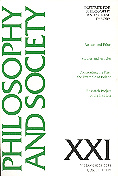KRIZA MODERNE KAO KRIZA POLITIČKOG (KA KRITICI OBIČAJNOSNOG UMA)
THE CRISIS OF MODERNITY AS THE CRISIS OF THE POLITICAL: TOWARDS A CRITIQUE OF THE REASON OF THE ETHOS
Author(s): Simo ElakovićSubject(s): Politics / Political Sciences
Published by: Institut za filozofiju i društvenu teoriju
Keywords: crisis; modernity; political philosophy; ethos; arête; virtus; evil; freedom; totality; power
Summary/Abstract: The crisis of modernity as the crisis of the political is seen by the author primarily as a crisis of the “measure” of the criterion of political decision making and action. This crisis is understood in the first place as a crisis of self-awareness and practice of the ethos. Machiavelli was the first to attempt a solution to this problem by introducing the concept of virtus, which became the fundamental principle of modern political philosophy. However, many modern and contemporary interpreters of Machiavelli’s thought often ignore the social and political context in which the political doctrine of the Florentine thinker arose. Namely, Machiavelli’s effort to find an authentic form of the political act that would make possible a harmonization and stabilization of the dramatic political circumstances then prevailing in Italian cities required a reliable diagnosis and adequate means for a successful therapy of the sickorganism of the community. The epochal novelty in Machiavelli’s political theory was the shift from the ancient theorization of virtue to its modern operationalization. Nevertheless, this shift is often interpreted as a radical opposing of the Greek concept of arete to the Roman virtus, which is crudely and simplistically reduced to bravery and strength necessary for taking and keeping political power. Hegel in his political philosophy travels an important part of the road – unconsciously rather than consciously – along with Machiavelli and Schelling. This particularly holds for his understanding of the necessity of strength and bravery in the process of operationalizing the spirit of freedom in history through the mediation of “negation” as “the power of evil”. The mediation of subjectivity and substantiality, according to Hegel, takes place in the state by the brutal bridling of the world spirit where not just individuals but whole peoples are sacrificed – toward freedom, i.e. its realization in the community of the ethos. The “trouble of the times” is a consequence of the separation between I and the world (Entzeiung) and stems from a reduced political reason which lacks the criterion of the ethical totality for political action and decision making. By the separation of the ethos this reason get routinized and political action is reduced to naked technique of winning and keeping political power. In the concluding segment of the paper the author points to some global consequences of the crisis of political decision making in the historical reality at the end of 20th century.
Journal: Filozofija i društvo
- Issue Year: 2002
- Issue No: 21
- Page Range: 61-85
- Page Count: 25
- Language: Serbian

